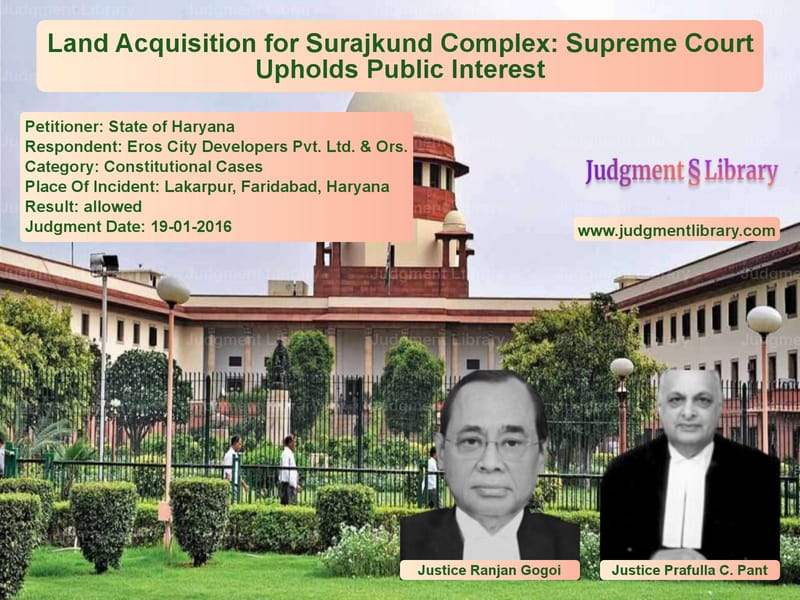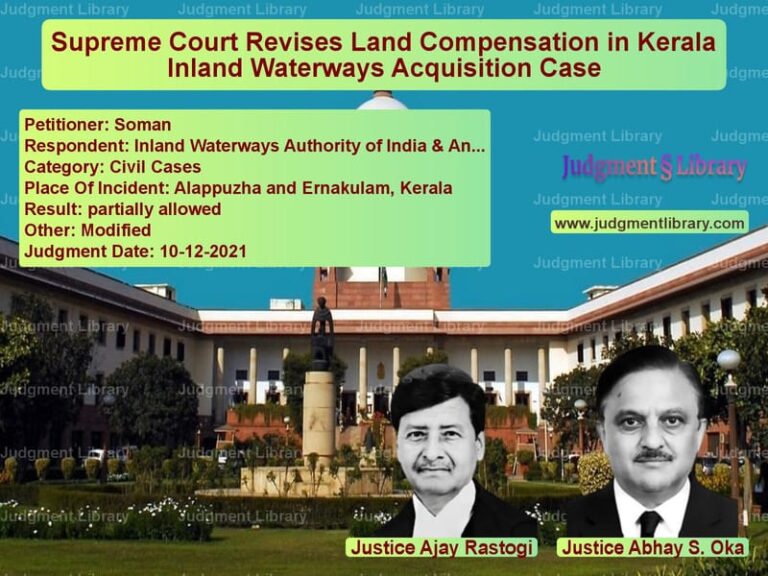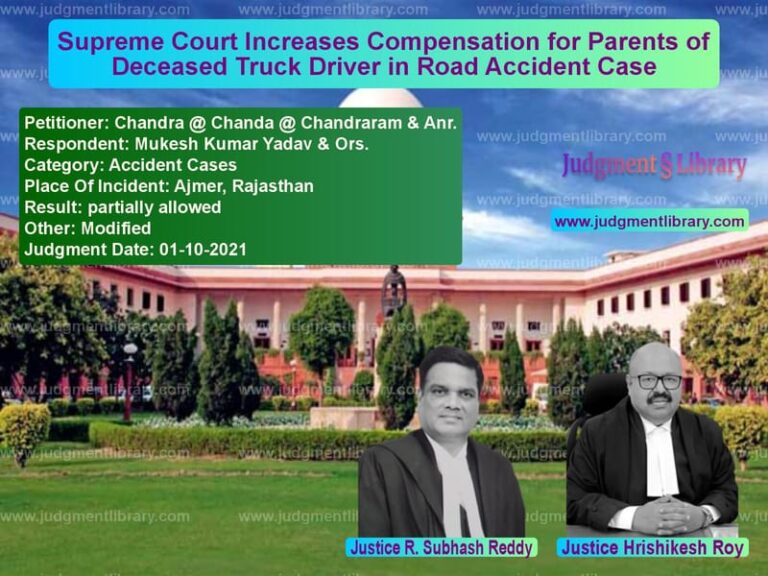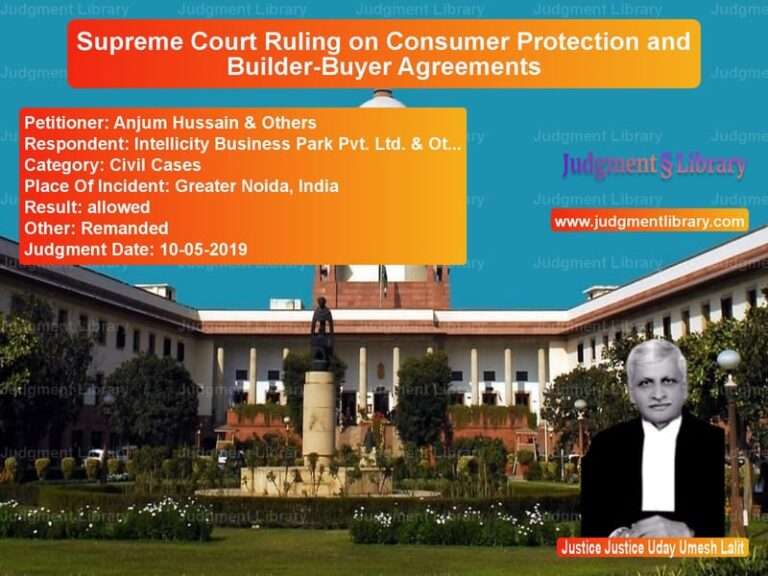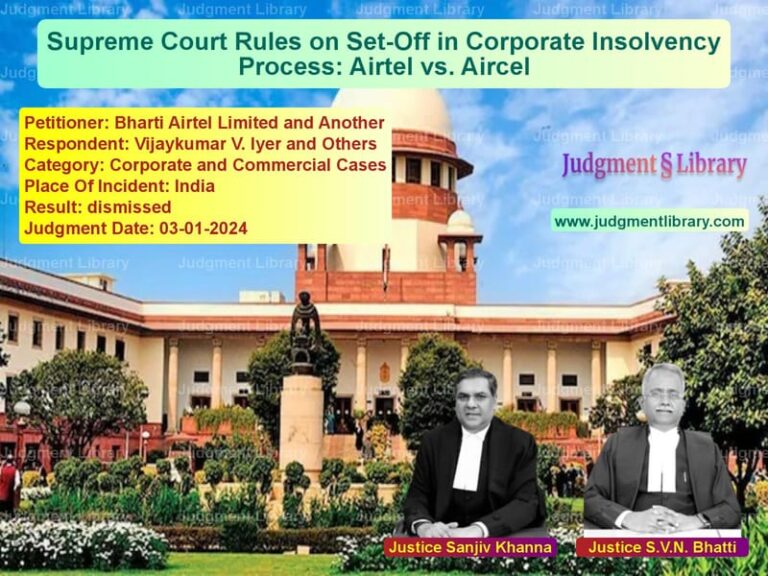Land Acquisition for Surajkund Complex: Supreme Court Upholds Public Interest
The case of State of Haryana v. Eros City Developers Pvt. Ltd. & Ors. revolves around the acquisition of land for the systematic development of the Surajkund Tourist Complex in Faridabad. The Supreme Court overturned the Punjab and Haryana High Court’s ruling that had quashed the acquisition of land, reinforcing the doctrine that public interest outweighs private commercial interests.
Background of the Case
The Government of Haryana had issued notifications under Sections 4 and 6 of the Land Acquisition Act, 1894, for acquiring 129 kanals and 14 marlas of land in Lakarpur, District Faridabad, for expanding the Surajkund Tourist Complex. The land in question was owned by various individuals and companies, including Eros City Developers Pvt. Ltd. The acquisition was aimed at creating infrastructure, including a parking area, to accommodate the increasing number of visitors at the annual Surajkund Fair.
However, Eros City Developers challenged the acquisition, arguing that the land was purchased for a private hotel project and that the State had acted in bad faith. The Punjab and Haryana High Court quashed the acquisition, ruling that the government had failed to establish public necessity. The State of Haryana appealed the decision to the Supreme Court.
Key Legal Issues
- Whether the acquisition of land for the expansion of the Surajkund Tourist Complex constituted a valid public purpose.
- Whether the doctrine of promissory estoppel and legitimate expectation applied to the respondents.
- Whether the State of Haryana’s decision to acquire the land was arbitrary and lacked bona fide intent.
Arguments Presented
State of Haryana’s Arguments
- The State argued that the Surajkund Mela had gained international prominence and required additional land for development.
- It contended that the acquisition was necessary to create infrastructure, including parking facilities, for the annual fair.
- The State asserted that the High Court had failed to consider the larger public interest and instead prioritized private commercial interests.
Respondents’ Arguments
- The respondents argued that the land had been purchased for a private hotel project with requisite permissions for change of land use.
- They claimed that the State had previously attempted to acquire the same land in 1992 but had dropped the acquisition, indicating that there was no real public necessity.
- They invoked the doctrines of promissory estoppel and legitimate expectation, arguing that they had relied on government approvals to develop the property.
Supreme Court’s Ruling
The Supreme Court ruled in favor of the State of Haryana, setting aside the High Court’s decision and upholding the land acquisition. The key observations made by the Court were:
Public Interest and Land Acquisition
- The Court held that the development of infrastructure for a major public event like the Surajkund Mela was a legitimate public purpose.
- “The project for which land is acquired should be taken as a whole and must be judged whether it is in the larger public interest.”
- The Court referenced Sooraram Pratap Reddy v. District Collector (2008) 9 SCC 552, which held that infrastructure development constitutes a valid public purpose.
Doctrine of Promissory Estoppel and Legitimate Expectation
- The Court rejected the respondents’ claim that they had a legitimate expectation to develop a hotel project.
- “The protection of legitimate expectation does not require fulfillment where an overriding public interest requires otherwise.”
- It cited Monnet Ispat & Energy Ltd. v. Union of India (2012) 11 SCC 1, which held that personal benefit must give way to public interest.
Bona Fide Intent of the State
- The Court found no evidence of mala fide intent on the part of the State in acquiring the land.
- It noted that the earlier acquisition attempt in 1992 was dropped due to environmental concerns but was later revived when restrictions were modified.
- “The High Court is incorrect in holding that the State has not acted bona fide.”
Key Takeaways from the Judgment
- Infrastructure Development is a Public Purpose: Acquisition for projects like the Surajkund Mela is valid and serves the greater good.
- Estoppel and Expectation Doctrines Have Limits: Private businesses cannot claim absolute rights over land when public interest demands otherwise.
- State’s Discretion in Land Acquisition: Courts should not second-guess acquisition decisions unless there is clear evidence of arbitrariness.
Impact of the Judgment
This ruling has significant implications for land acquisition laws in India:
- For Governments: It affirms that acquisition for public infrastructure projects will be upheld if done in good faith.
- For Private Developers: It clarifies that permissions for change of land use do not create absolute rights against acquisition.
- For the Judiciary: It sets a precedent that courts should not interfere with land acquisition unless clear legal violations are established.
Conclusion
The case of State of Haryana v. Eros City Developers Pvt. Ltd. underscores the principle that public interest should prevail over private commercial interests. The Supreme Court’s ruling ensures that infrastructure projects crucial to public welfare are not derailed by individual claims, reinforcing the government’s authority in acquiring land for development.
Don’t miss out on the full details! Download the complete judgment in PDF format below and gain valuable insights instantly!
Download Judgment: State of Haryana vs Eros City Developers Supreme Court of India Judgment Dated 19-01-2016.pdf
Direct Downlaod Judgment: Direct downlaod this Judgment
See all petitions in Fundamental Rights
See all petitions in Public Interest Litigation
See all petitions in Legislative Powers
See all petitions in Judgment by Ranjan Gogoi
See all petitions in Judgment by Prafulla C. Pant
See all petitions in allowed
See all petitions in supreme court of India judgments January 2016
See all petitions in 2016 judgments
See all posts in Constitutional Cases Category
See all allowed petitions in Constitutional Cases Category
See all Dismissed petitions in Constitutional Cases Category
See all partially allowed petitions in Constitutional Cases Category

